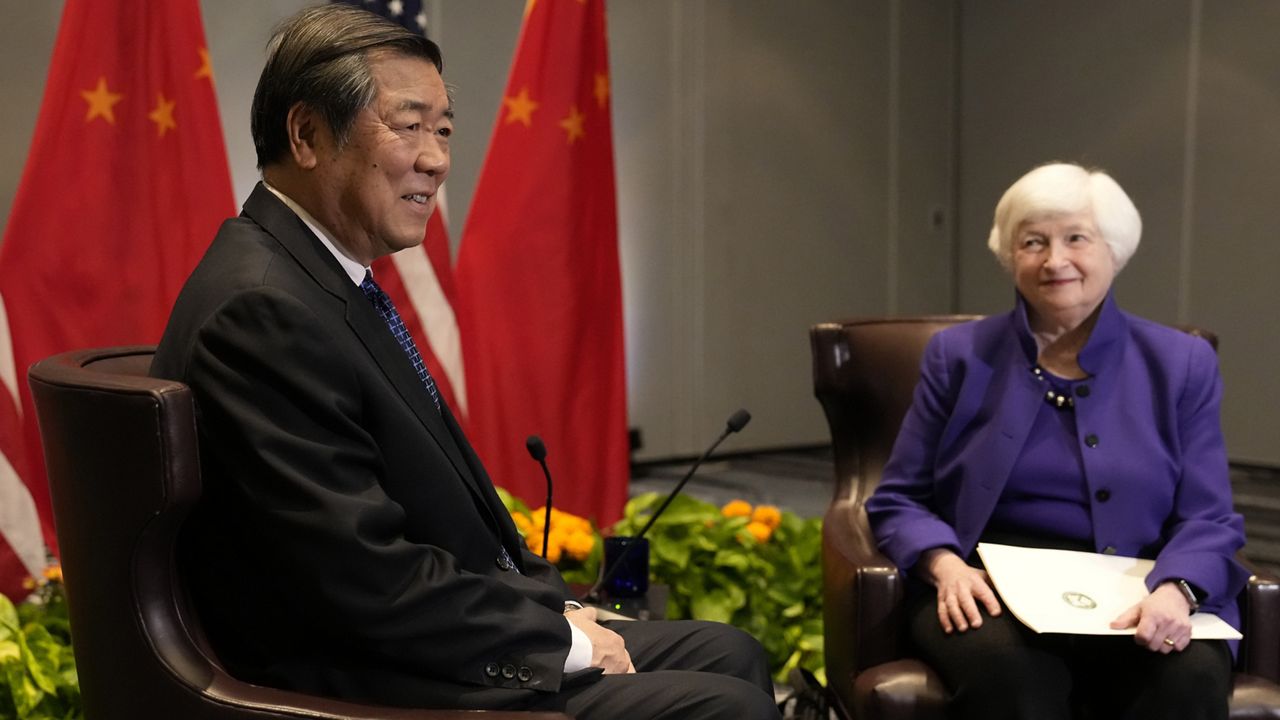Marking the latest effort to ease recently-tense relations between the U.S. and China, Treasury Secretary Janet Yellen on Friday emerged from a meeting with Chinese Vice Premier He Lifeng declaring a shared goal of “a healthy economic relationship” between the world’s two largest economies.
The common objective came out of two days of intensive talks between Yellen and her Chinese counterpart in San Francisco, the city in which leaders of Asia-Pacific nations will descend for economic talks next week and the location of President Joe Biden’s highly-anticipated meeting with Chinese leader Xi Jinping on Wednesday.
“The past two days of meetings in San Francisco have served as another step forward,” Yellen said during a press conference on Friday. “I'm confident that our discussions have also helped lay further groundwork for a productive meeting between President Biden and President Xi.”
Conceding that “areas of disagreement” remain, Yellen said she and He agreed to “continuing a regular cadence of contact” and “to work together on global challenges from debt issues to climate change-related economic issues.”
Yellen said she raised concerns about China’s non-market policies and restrictions on exports of graphite and other critical minerals key to Biden’s EV goals.
The secretary added she stressed to the Chinese vice premier that companies must not provide materials to support Russia in its war with Ukraine.
“We do see evidence that there are Chinese firms – and I'm certainly not saying with the knowledge of the Chinese government – but some Chinese private firms that may be aiding in the flow of this equipment and materials to Russia,” Yellen said. “I stressed in our conversations that it's critical to us that companies not provide material support.”
The meetings followed months of efforts on the part of the U.S. to cool simmering relations with China over Russia’s invasion of Ukraine, Taiwan and more. Tensions escalated this year when the U.S. shot down a Chinese surveillance balloon flying over U.S. airspace and news of a Chinese spy base in Cuba became public.
This summer, the Biden administration deployed top cabinet secretaries to Beijing to make inroads in putting the two world powers back on sounder footing.
Yellen visited herself in July while Commerce Secretary Gina Raimondo made the trip in late August.
In a closely-watched visit in June, Secretary of State Antony Blinken met with Xi and other senior Chinese officials. But America’s top diplomat left the region without the Biden administration’s biggest ask: better communications between their militaries.
Economic competition between the two has intensified with Chinese officials accusing the U.S. of trying to stifle China’s development. U.S. officials have rejected that, saying they are aiming to pursue competition while ensuring it doesn’t boil over into conflict.
Yellen reiterated that sentiment on Friday, repeating that the U.S. is not looking to “decouple” from China.
“We do not seek to decouple our economy from China's. This would be damaging to both the U.S. and China and destabilizing for the world,” she said. “But a healthy economic relationship requires American workers and firms to be treated fairly.”
In August, the U.S. announced an executive order banning or restricting U.S. investment in Chinese technology sectors, covering advanced computer chips, micro electronics, quantum information technologies and artificial intelligence in a move administration officials said was focused more on national security than economic issues.
It all sets the stage for the Asia-Pacific Economic Cooperation summit next week and the high-stakes meeting on its sidelines between Biden — who recently called China’s economy a “ticking time-bomb” — and Xi.
Wednesday will mark only their second face-to-face set down since Biden became president, with the first taking place almost a year ago at the Group of 20 summit.



